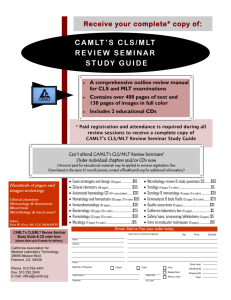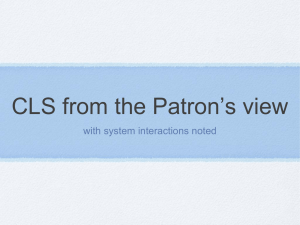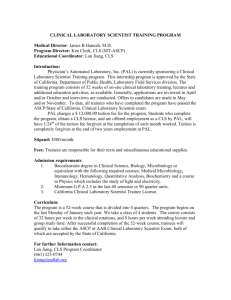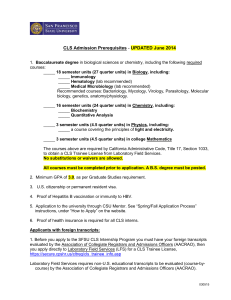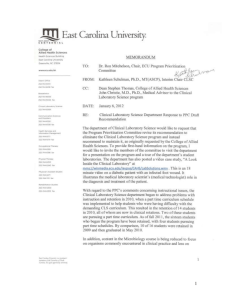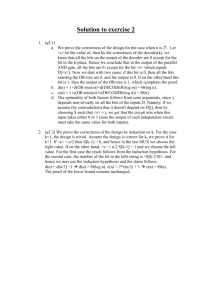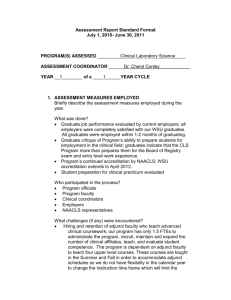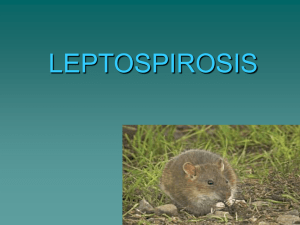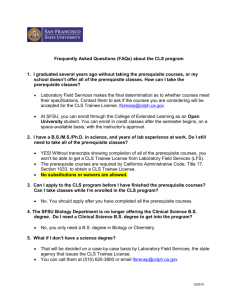Careers in Laboratory Medicine Presentation
advertisement
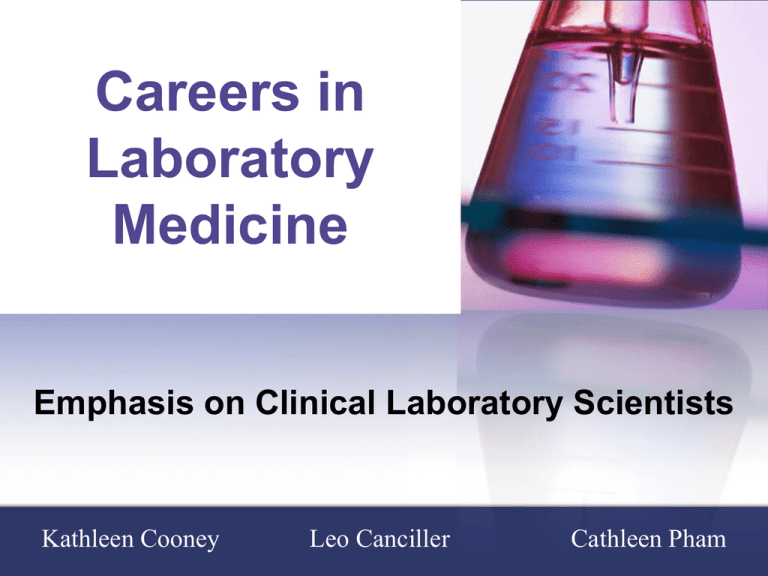
Careers in Laboratory Medicine Emphasis on Clinical Laboratory Scientists Kathleen Cooney Leo Canciller Cathleen Pham Did you know….? Laboratory tests are extremely valuable 80% of physician decisions regarding patient diagnosis and treatment are based on clinical laboratory test results! Demand for laboratory professionals will exceed supply in the near future Questions to ask yourself… Have you enjoyed your biology and science laboratory classes? Do you want a career in healthcare? Would you like an exciting and rewarding career helping others? Would you like to be part of a growing field with flexibility and job security? Medical Laboratory Professionals Phlebotomists Lab assistants Cytotechnologist Histotechnologists Clinical Laboratory Scientists Pathology assistants Pathologist Phlebotomist & Lab Assistant Draws blood for laboratory testing Process samples to be tested by the Clinical Laboratory Scientists “The face of the lab” Educational Requirements: High school Diploma CPT license 3-4 month training at an accredited program such as Kaiser Permanente School of Allied Health Sciences or Community Colleges Entry-level Salary: $23/hr Histology Technician (HT) Prepares solid tissues such as biopsy samples and tumors for examination under the microscope A.A. degree, science courses 1 year of clinical training, HT certification Programs: Kaiser Reg. Lab.; San Antonio College; online programs with clinical partners Starting salary: $35+/ hour Cytotechnologist (CT) Prepares and examines slides of cells; Pap tests for cervical cancer; other types of specimens as well. B.A. degree, certification as a Cytotechnologist, Calif. CT license Certificate programs: Loma Linda University Cytotech.Prgm; UCLA Sch. Of Cytotechnology Starting salary: $43/hour Clinical Laboratory Scientists (CLS) Old terminology: Medical Technologist (MT) “medtechs” New terminology: Medical Laboratory Scientist (MLS) Performs a variety of complex laboratory tests. Starting salary: $40/hour What does a CLS do? Play a critical role in the detection, diagnosis, and treatment of disease Microscopically examine blood, tissue, and other body fluids Culture body fluid or tissue samples to determine the presence of bacteria, fungi, parasites, or other micro-organisms Analyze samples for chemical content or reaction What does a CLS do? (cont’d) Crossmatch blood samples for transfusion Operate automated equipment and sophisticated instruments that perform a number of tests simultaneously Prepare specimens for examination, count cells, and look for abnormal cells Analyze the results of tests performed and relay them to physicians What does a CLS do? (cont’d) Develop and modify procedures Establish and monitor programs to ensure the quality and accuracy of tests Supervise technical and non-technical personnel Develop processes focused on continual improvement and regulatory compliance Departments in the Clinical Laboratory Hemostasis/Coagulation Urinalysis Toxicology Immunochemistry Flow Cytometry Hematology Bacteriology Genetics Serology/ Immunodiagnostics Mycology Parasitology Mycobacteriology/AFB Virology Chemistry Immunmohematology Molecular Diagnostics Newborn screening Hematology Study of Blood Cells Useful in diagnosing: Cancers Infections Leukemia Lymphoma Mono Malaria Bacteria Anemia Sickle cell Iron deficiency Immunohematology Transfusion Services/Blood Bank Testing for patient/donor compatibility Trauma patients Anemia Surgery Bleeding disorders Chemistry Chemical analysis of biological specimens Useful in diagnosis of: Drug abuse Diabetes Heart attacks Kidney and liver diseases Cancer Thyroid diseases Microbiology Study of microbes Helps in detection of: Bacterial infections Viral infection HIV, hepatitis, herpes, mono, HPV Parasitic infections UTI, strep throat, STDs, tuberculosis Worms, amoebas, flukes Mold/Yeast infection Molecular Diagnostics Uses molecular techniques such as: PCR Western Blot Gel Electrophoresis Microarray Flow Cytometry Diagnosis and study of: Cancer Infections Genetic predisposition to certain diseases Therapeutic decision and monitoring Educational Requirements A Baccalaureate degree from an accredited college/university with courses in biological science, chemistry and mathematics 1 year of professional/clinical education by a State approved provider, including interning in an accredited clinical laboratory Licensure, certification and continuing education throughout career Northern CA CLS Programs SFSU CLS Internship Program SJSU CLS Internship Program UC Davis Med. Center. CLS Internship Program UCSF Med. Center Limited license program (Blood Bank, Hematology, Microbiology, & Chemistry) Career Ladder for Clinical Laboratory Professionals Pathologist Medical laboratory technician (MLT) Laboratory assistant Phlebotomy technician Why Choose CLS? Integral part of the medical community Good salary Flexible hours Job availability & security Advancement Versatility Challenging Exciting! Job opportunity Job opportunities Hospitals Laboratories Physician Office Laboratories Independent or Reference Laboratories Public Health Laboratories Pharmaceutical Companies Fertility Clinics Veterinary Laboratory Biotechnology Resources www.labsciencecareers.com Labs are Vital www.ascp.org www.ascls.org Amer. Soc. of Clin. Lab. Sciences www.asm.org American Society of Clinical Pathology Amer. Soc. of Microbiology www.naacls.org National Accrediting Agency for Clinical Laboratory Sciences Questions? Created and Presented by: Leo Canciller, CLS intern, Kaiser Medical Center, SF Kathleen Cooney, CLS intern, Kaiser Regional Lab Cathleen Pham, CLS intern, Kaiser Regional Lab This presentation would not have been possible without the help and input of Kaiser Permanente’s Subject Matter Experts. Thank you to: Keith Ng, Quality Manager, Regional Lab Carola Howe, MS, CLS, Education Coordinator, Regional Lab
